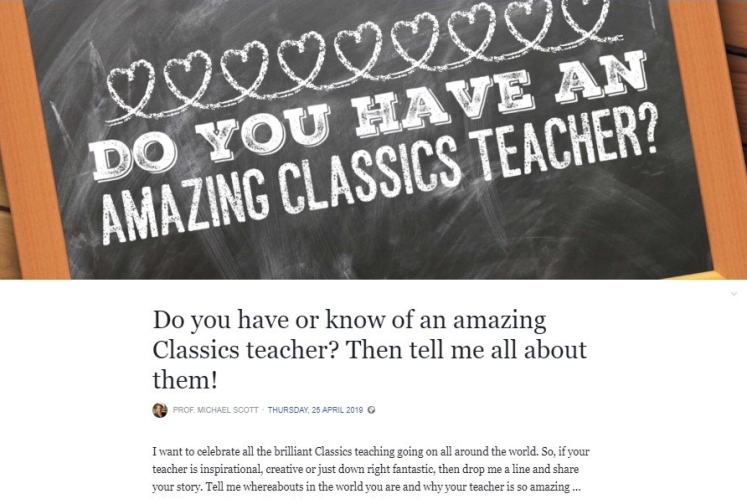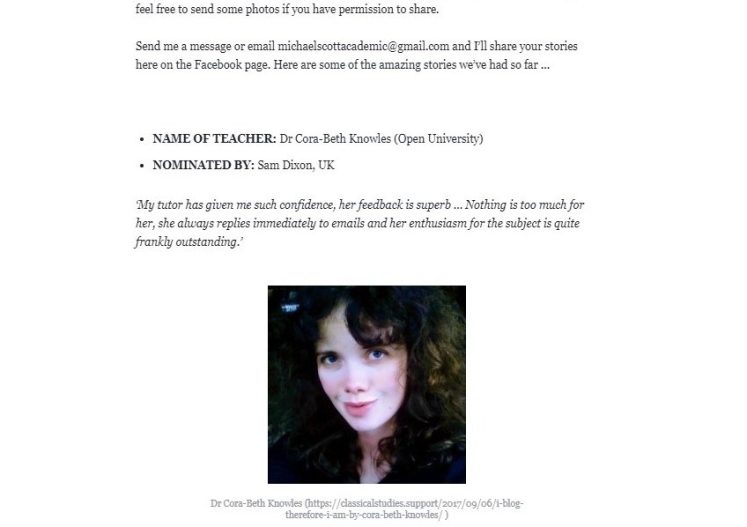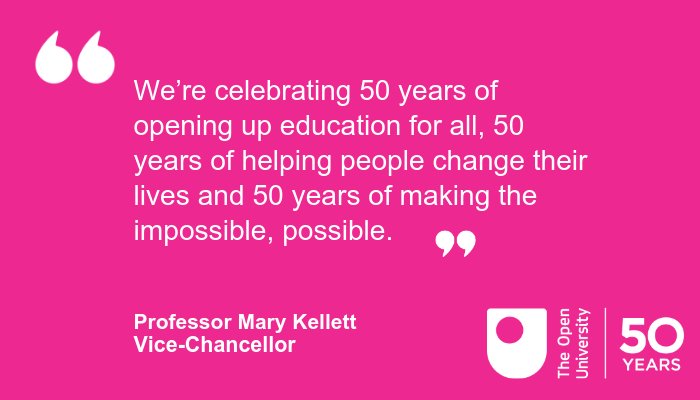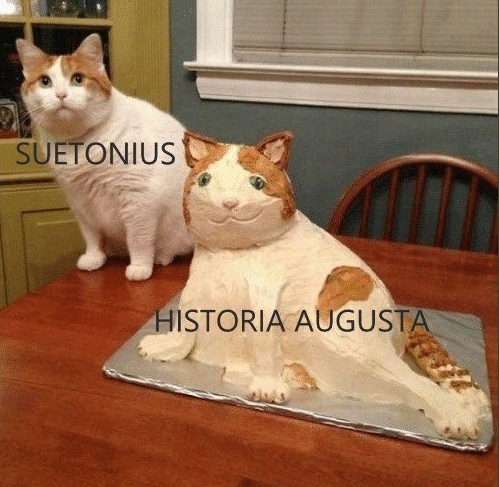In the news this week there’s been a lot about The Open University’s 50th birthday. (I wasn’t there for the party, but I hear there was cake.)

Being an OU person myself, I thought I’d use this week’s post to look back on some of the highlights – and low points – of my own 16 years with the university. Put your feet up and pour yourself a drink: this could take a while…!
[For some less provincial accounts of changes in the OU’s Classics Department over 50 years, read Lorna Hardwick and Chris Emlyn-Jones over on the OU Classical Studies blog. They look at how the curriculum has developed over the years, and at the rich collaboration with the BBC. You should also watch the BBC’s birthday documentary, presented by Lenny Henry. And below I have some Twitter highlights for you…]
The distinctive thing about the OU, in my experience, is that it inspires an unusual degree of loyalty. People take on OU study as almost a way of life, so in that sense it’s habit-forming – but many of us (students and staff) are also passionate about what the OU represents, and proud to be associated with it. I know many former students who have gone on to be tutors with the OU; and I also know many tutors who’ve gone back to being students. I’ve done both of those things.
I first encountered the OU when I was 21, and about to start my first year of a Classics PhD at a brick university. I’d been asked to teach a big class: Beginner’s Greek, back in the days when a semester of Greek was compulsory for all Religious Studies students, so the room was always full of people who didn’t want to be there. I was panicking. I’d never taught before, I had no confidence and no training, and I didn’t have the faintest idea where to start. So I went looking for a distance Education course, and stumbled across the OU.
It’s fair to say that the OU was a revelation to me. It was like that moment when Charlie walks through the door into the garden with the chocolate river, where everything is made of sweets. I’m sure I heard Mr Wonka singing ‘…anything you want to, do it…’ when I first sent for a prospectus. Suddenly a whole pick-and-mix selection of subjects was opened up for me, complete with a promise that nobody would look directly at me or laugh at my Geordie Greek. For a compulsive skulker like me, with a mental list of all the best back staircases, broom cupboards and alcoves for hiding in (one day I discovered the hidden staircase which led to the roof, and I spent two years hiding behind a chimney pot with the Loeb Tacitus), distance learning was a special form of heaven. I could learn whatever I wanted, and nobody would be watching.

I did a couple of Education courses, then got bored and switched to Social Sciences more generally, picking up modules on visual culture and identity. I finished my first Open University Masters degree (MEd) at the same time as I finished my Classics PhD. By that point I knew that I wasn’t cut out for the politics and pressure of a traditional university post – and that I would cut off my own arm for a chance to work for the OU.
First I applied for a teaching post on an OU Greek History module. This was a long shot for me: beyond a fairly extensive knowledge of weaponry (don’t ask!), I didn’t have a clue about Greek history. But I reckoned it was worth it for a chance, however remote, to become an AL (‘Tutor’ is the term used by most students; ‘Associate Lecturer’ or ‘AL’ is how we’re known to the rest of the university).
The interview was, as you can imagine, a bit tense. It went well, though, since the interviewers didn’t know anything about Greek history either. Unfortunately I was told that although I had been deemed ‘appointable’, there wasn’t actually a post available, since student numbers in the region were lower than expected. But they said they would call me if something else became available.
I went away disheartened – because let’s face it, nobody ever calls you out of the blue to hand you the perfect job – and took some temporary jobs teaching Classics in schools as a supply teacher. The first school had a panic button outside each classroom, and a rapid response team for “incidents”. The second school had a thief among the staff, and nobody batted an eyelid when my purse disappeared on my first day in the staff room. I was 25 years old, with four university degrees and more academic prizes than you could shake an augury stick at, and I was so fed up with the world of Classics that I was planning to go back to work in the office of my cousin’s cleaning company, where at least I might be able to get through the day without having to write a police report or be rescued by the A-Team.

Then, a few weeks later, the OU called me out of the blue to hand me the perfect job. A Roman History course had a vacancy and they’d thought of me.
Roman History! Togas and tribunes and war elephants! Gene Wilder was back again, singing ‘If you want to view paradise…’ in the background.
I jumped at that Roman History course (anyone remember AA309?); then they offered me the Advanced Latin course, then the Greek course… and they’ve been keeping me busy ever since.
Back then, thirteen years ago, marking was all biros and carbon paper; I still have one slightly deformed finger from years of pressing through three layers of paper! Assignments for marking arrived by post; if the postman walked right past my door without stopping, I knew I had the day off. I could set my own schedule: even on rough marking days I could start work at 5am, and finish at 2pm to go for a walk on the beach with an ice-cream cornet. It was brilliant.
The Classics department, too, was great. Janet Huskinson showed me the ropes and gave me the sort of encouraging feedback you need when everyone around you talks in mysterious acronyms. Paula James went to the trouble of coming up to the North of England to spend a weekend with my students in the first year of A330, when I had a terrifying 92 people in my group.
And the students were – well, they weren’t anything like the Grumpy Greek class I’d spent three years teaching at my old university. They were inspired, and inspiring. I encountered people with disabilities and illnesses, people who’d given up almost everything to care for family members, people who’d been forced out of education many years before and somehow found the courage to come back. They made me see Classics in a different way, as something that could bring joy or comfort to people in the most desperate situations.
I’ve encountered all kinds of fabulous people over the years. There was the elderly gentleman who would send me books when he had ‘accidentally ordered two copies for himself’ – books which just happened to cover topics I didn’t know much about. There was the retired military officer who lived in a castle, and who used to regale me with tales of his colourful life and his theories about tactics in Tacitus. There was the student serving life in a maximum security prison, who used to carry his module books around the prison yard to display his superior intellect. There was the shepherd who discovered a passion for Virgil, and would read the Georgics and Eclogues to his sheep. There was the lady who broke both her arms in a terrible accident near the end of the module, but still managed to find a way to write her EMA. I’ve met Olympic athletes, neurosurgeons, poets, farmers and sailors. I’ve met their children, their pets and sometimes their parents. I’ve travelled all over the UK, teaching Classics in universities, libraries, prisons and people’s sitting rooms.
Every year there are different stories. My favourite time of year is the very start of a module, when my inbox is full of emails beginning, ‘I thought I’d just give you some idea of my situation…’. And my favourite students are not the obviously extraordinary ones, but the ones who genuinely believe that there’s nothing special about them: as if just anybody could juggle a job and a family and a Classics degree.
Then there are the ex-students who’ve gone on to become friends: the ones I hear from regularly, or meet for a drink when they’re in the area, or receive an email from, once or twice a year, letting me know how they’re getting on. They’ve taught me that I always was a “people person”: I just needed to find the right sort of people.
[On that note, I’d like to send a big thank-you to MA student Sam for nominating me this week for Prof Michael Scott’s Facebook feature on ‘amazing Classics teachers’. See what I mean about my students being fabulous?!]


Working for the OU hasn’t been all joy, of course. The move from paper assignments to electronic assignments took several years, and encountered much resistance – from students and some tutors too. That’s settled down now: but we still allow paper submissions in some cases, because not everybody is able or willing to use a computer, and the OU makes space for that.
The move from face-to-face tutorials to online tutorials has been more fraught. It’s an issue which will continue to stir up strong feelings for many years to come – and rightly so, I think. For a while, when the Regional Centres closed a few years ago, we all thought that the OU was heading towards becoming a ‘university of the cloud’ – and a lot of people were planning to leave if that happened. Thankfully things have changed, and a more moderate course has been charted. (Well, that’s like saying ‘Augustus achieved peace in the Empire’, without mentioning the piles of bodies he walked over to get there. Things have changed at the OU: but the last couple of years have been dramatic, to say the least!)
OU tutoring is not always a comfortable job to have. At the moment most ALs have to make it through three months every year when we’re barely paid anything, and we never know from one year to the next how much work we’ll have, or even if we’ll have a job at all. But changes are afoot, and in a couple of years I hope it will be a very different story.
There’s one significant perk of the job which I absolutely love, and it’s the reason why I wouldn’t hesitate to recommend this job to anyone who, like me, loves to learn. It’s called the ‘staff fee waiver’. Effectively, we get to study one module a year for free. Over the years I’ve used this to study English Literature, Creative Writing, Physics and Astronomy. I’ve collected a second BA, and I spent three years working towards the MA in Online and Distance Education, rethinking my assumptions about online teaching in the process. Now I’m using the fee waiver to do a second doctorate, this time in Education. It’s going to be a long haul: but as most of my readers know, OU study is rarely quick, and never easy!

So I’d like to wish the OU a very happy birthday, and many happy returns! I hope I can be around to watch its next 50 years.

This week in the online world of Classics…
News
Greek myth in Glasgow – The Extra
A new ‘Trojan Women’ – The Hindu
Journal website scam – Society for Classical Studies

Comment and opinion
Rome’s feuding physicians – Washington University in St. Louis
Boticelli and Lucretia – A Don’s Life
On deciding to defer – Classical Fix
A chariot-racing superstar – Live Science
Art, Classics and the French Revolution – Hyperallergic
Tragedy and philosophy – NPR
The Curious Roman – The History Girls
The job market for Black classicists – Eidolon
More on war elephants – Ancient Blogger
Romans and invisibility cloaks – Physics World
Terrifyingly precise Greek executions – Forbes
Why do we quote so much? – Sententiae Antiquae
What would the Greeks think of modern technology? – Nautilus
When Cyrus forgot his helmet – The Historian’s Hut

Podcasts, video and other media
The difference between prose and verse – Alliterative
The road to war – The History of Ancient Greece
Divide and conquer – The Partial Historians
Interview with Rebecca Futo Kennedy – Itinera
‘In Our Time’ on Nero – BBC Radio 4
Vercingetorix – Ancient History Fangirl

AA309 – 2007 – baptism by fire! ;-D
LikeLike
Except for tutorials at Gosforth High School, where the heating was turned off at the weekend. George was always complaining about being frozen…!
LikeLike